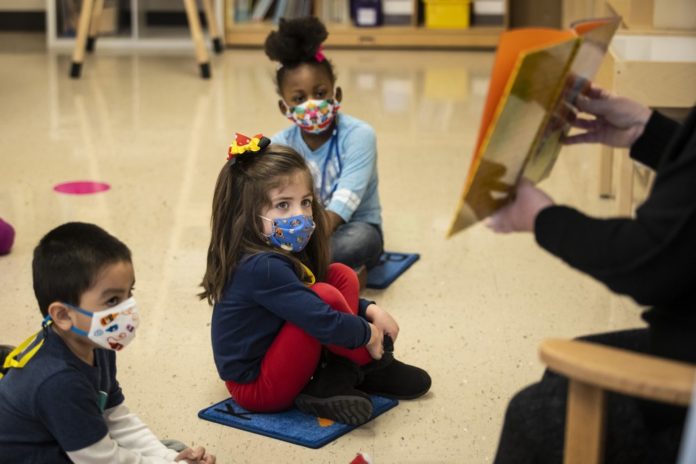A judge is set to hear arguments Monday in a case seeking to overturn several new Arizona laws that restrict the power of local governments and school districts to impose COVID-19 restrictions such as mask mandates.
The coalition of educators, parents, and children’s advocacy groups argue in their lawsuit that the provisions were unconstitutionally tucked into unrelated budget bills.
The attorney representing Attorney General Mark Brnovich says they were legally enacted because how the Legislature writes measures and chooses the content are questions for lawmakers, not for the courts. They also argue the groups don’t have a right to sue because they have not been harmed by the laws.
The laws being challenged would prohibit public school districts from imposing mask requirements, bar universities from requiring vaccinations for students, and forbid communities from establishing vaccine passports for people to show they are inoculated.
The groups behind the challenge argued the provisions in several budget bills violate constitutional rules requiring laws to focus on only one subject and have their contents reflected in the title of the bills. In the case of the school mask ban, they allege it violates equal protection provisions because it does not apply to private schools.
Based on this legal contention, the coalition is asking the judge to undo two other laws unrelated to COVID-19 prevention efforts.
One law prohibits the use of state money for teachings at schools that infer that one race is inherently racist, should be discriminated against, or feel guilty because of their race. Another law establishes a legislative committee to review the findings of the state Senate review of the November 2020 election results in Maricopa County. The Legislature has routinely tucked all sorts of unrelated items into the budget bills but this year crammed many more than usual. The challengers allege they violate the constitution in each instance.
“Does a bill titled ‘Relating to State Budget Procedures’ give notice that it includes new, substantive legislation covering everything from the definition of ‘newspaper’ to condominium termination requirements, and from investigation of social media platforms to dog racing permitting?” attorney Roopali Desai wrote. “Of course not.”
Attorney Patrick Irvine, representing Brnovich, said a court ruling agreeing that the Legislature violated either the title or single-subject rules could upend years of enacted “budget reconciliation bills” or “omnibus reconciliation bills” that also added unrelated policy items. Irvine said if the court is concerned about the Legislature’s practice, it should ban it going forward, not block the current laws.
“Potentially upsetting scores of BRBs and ORBs, with no warning, would be highly inequitable to the democratic process in Arizona over the last several decades,” Irvine wrote.
Maricopa County Superior Court Judge Katherine Cooper will weigh the request to block the laws from taking effect as scheduled on Sept. 29 at a Monday afternoon hearing.
The lawsuits say the delta variant of COVID-19 makes the need for masks more pressing. The state on Monday reported 2,278 new confirmed cases but no new deaths, bringing the total since the pandemic hit Arizona in early 2020 to 1,050,878 cases and 19,187 deaths.
Despite the new laws banning mask mandates, at least 29 public school districts in Arizona have enacted their own mask requirements. The districts account for more than a third of the approximately 930,000 students attending more than 2,000 schools run by public districts.
In other developments Monday, University of Arizona President Robert Robbins announced the college will begin offering take-home COVID-19 test kits later this week. The tests will be available at nine campus locations. Students and staff give a sample by gargling. They use their cellphone to scan the test, so it’s in the tracking system and then turn the sample in. Robbins believes a lot more people will get tested with this option, thus giving a more accurate picture of the positivity rate in the community.
Republished with the permission of the Associated Press.















